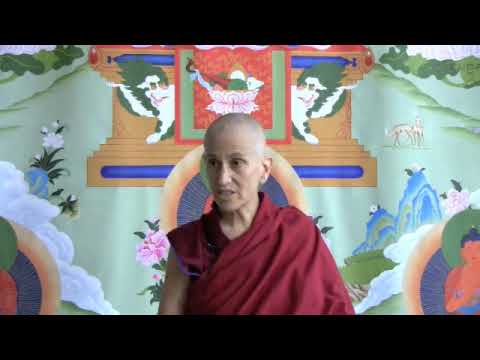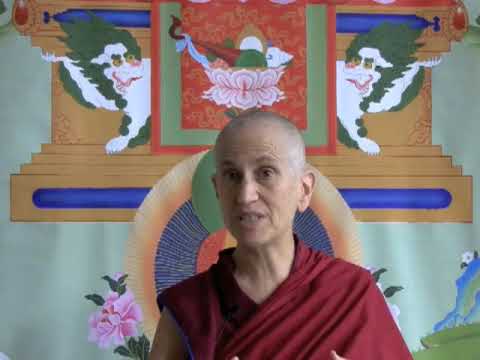Naturally negative versus proscribed actions
Part of a series of Bodhisattva's Breakfast Corner talks on the Stages of the Path (or lamrim) as described in the Guru Puja text by Panchen Lama I Lobsang Chokyi Gyaltsen.
A few more things along the line of karma. One is the difference between naturally negative actions and proscribed actions. Proscribed actions are things that the Buddha in our precepts said not to do, but naturally negative actions are ones that in general, if an ordinary person does them, they create negative karma. Some people say even if you have realizations there might be some negative karma involved, but in general (we’re) speaking about ordinary beings. Something like killing, stealing, lying, these things, in general whoever does them, they have a bad motivation and so they’re called naturally negative actions because our mind is polluted with anger, attachment, or the kind of rationalization and justification that makes it motivated by confusion. Whereas things like eating in the evening, even drinking alcohol, these things are not naturally negative. The ones that aren’t naturally negative in the context of the precepts, the Buddha may have said that monastics or lay people should not do these things and so therefore if you take that precept, that becomes a proscribed action, and thus if you do it, you’re creating some negative karma because you’re going against what the Buddha proscribed.
If we take an example of killing, for example, anybody who does that, whether they have a precept or don’t have a precept, there’s negative karma that they create. If, on top of that, you have a precept not to kill, then there’s some additional negative karma because you have the precept and you’re violating your precept. That’s why when we do the sojong, which we’ll do tomorrow, or the posada, the purification and restoration confession that we do every two weeks, we confess both the naturally negative and the proscribed actions, and then we reinstate ourselves. The way to kind of reinstate it is then if you have a complete sangha, you listen to the recitation of the precepts. Because we don’t have a complete sangha, we’re declaring our purity. In that way you’ve kind of admitted if there’s any proscribed actions that you’ve violated and cleared all that up. That’s the importance of going to sojong.
If you deliberately kill an animal or something, the negativity–because it’s a naturally negative action–you purify through Vajrasattva, 35 Buddhas, four opponent powers, but the part of it being a proscribed action you purify through going to the posada ceremony. Other things, like going outside of the boundary alone or these kind of things that are not naturally negative but are proscribed, then you purify those by going to the posada.
It’s helpful to know the difference between what is natural negative and what is proscribed because the way you accumulate karma is different around them. Let’s say eating in the evening, going outside the boundary, bathing more than twice a month, these things are not naturally negative because if people without precepts do them, they don’t necessarily have a negative intention. They may. Very often drinking alcohol, if you are taking intoxicants and you have attachment, then you’re creating negative karma by the power of the intention.
This is helpful to know, and understanding our precepts and how we create karma and so on. Also looking at why the Buddha prohibited alcohol and intoxicants is because if you do that, then you go and create all the other ones which are naturally negative. Whereas, let’s say something like eating in the evening or going outside the boundary or bathing more than twice a month or these kinds of things, somebody who does that doesn’t necessarily have attachment. A monastic is allowed to do those things in certain conditions, and when there’s the certain conditions, then there’s not the creation of negative karma by doing those things, but it’s still good to realize, to remember what those precepts are even if we have the necessary conditions to make it an exception to that at that time.
Venerable Thubten Chodron
Venerable Chodron emphasizes the practical application of Buddha’s teachings in our daily lives and is especially skilled at explaining them in ways easily understood and practiced by Westerners. She is well known for her warm, humorous, and lucid teachings. She was ordained as a Buddhist nun in 1977 by Kyabje Ling Rinpoche in Dharamsala, India, and in 1986 she received bhikshuni (full) ordination in Taiwan. Read her full bio.


